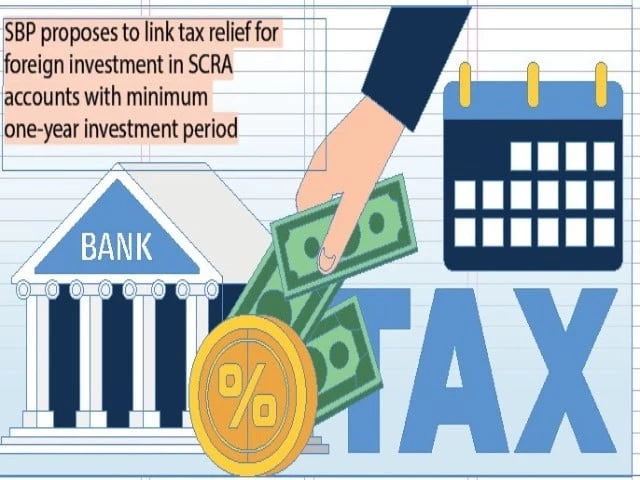SBP seeks tax on foreign investment
Ties tax benefits to one-year minimum retention as rupee weakens

As the local currency comes under renewed stress, the State Bank of Pakistan (SBP) on Saturday proposed linking tax benefits with a minimum one-year retention period for foreign investments in government debt and equity markets to bring predictability in outflows.
Dr Mohammad Ali Malik, an SBP executive, suggested the 10% reduced income tax rate should be tied to at least one-year retention of investment made through the Special Convertible Rupee Account (SCRA). He made the proposal during a meeting of the National Assembly Standing Committee on Finance, chaired by Pakistan People's Party (PPP)'s Syed Naveed Qamar.
Federal Board of Revenue (FBR) Chairman Rashid Langrial said that investors were securing tax advantages by making short-term investments. He recommended a minimum six-month holding period for investments in Roshan Digital Accounts and other schemes to qualify for tax benefits. With this, the central bank seeks more predictable dollar outflows.
However, the committee warned that such a move could deter investors, which the government could not afford.
Dr Malik argued that the condition would not disrupt current inflows, as significant investments in treasury bills, government bonds, and SCRAs were not presently being made. He said linking tax incentives with long-term investments could help stabilise outflows.
Under SBP regulations, non-residents may freely invest and trade in government marketable securities, including Pakistan Investment Bonds (PIBs), Treasury Bills (TBs), registered corporate debt instruments, and the Water and Power Development Authority (WAPDA)'s registered bonds through SCRAs.
Following months of stability, the rupee has again come under pressure due to increased debt repayments. The rupee's value has depreciated to around Rs284 per US dollar in the interbank market, with even higher rates in the open market.
A senior executive from a private commercial bank said large interbank transactions are being settled at nearly Rs3 above the average market rate.
In an economic alert issued Saturday, advisory firm Tola Associates warned that ongoing unrest in the Middle East and Pakistan's reliance on imported oil posed serious risks of economic disruption.
Crude oil prices, it stated, have surged over the past two weeks, rising from $63.76 on June 2 to $76.31 per barrel by June 19 due to the ongoing Gulf conflict.
Tola Associates noted a dual inflationary impact on Pakistan's economy: higher crude prices widen the current account deficit and weaken the rupee against the dollar, which further fuels inflation.
If crude oil hits $80 per barrel, the rupee may slide to Rs285.4 per dollar; if it rises to $100, the rupee could depreciate further to Rs292.1. In that case, local petrol prices may need to rise by Rs35 per litre, the firm said.
The government has already formed a committee, chaired by Finance Minister Muhammad Aurangzeb, to review the implications of Israel's illegal act of war against Iran on Pakistan's economy and petroleum flows.
Tola Associates said that the direct impact of higher crude prices on domestic petrol rates may further fuel inflation and make life more difficult for the people of Pakistan. It has estimated the additional impact of inflation by 1.8% in case crude oil price increases to $80 and 8.7% if the prices surge to $100.
The current account deficit is also projected to widen to $4.3 billion in the next fiscal year, if crude oil hits $100 price.
The standing committee also reviewed another proposal: taxing income from government debt investments even if withdrawn before maturity. Currently, some investors evade taxes by prematurely selling and rebuying securities — a tactic known as "coupon washing."
The FBR proposed in the budget that tax be charged on the investment regardless of early withdrawal, estimating an additional Rs10 billion in revenue. However, the committee adjusted the proposal, reducing the required holding period from one year to six months.
Last month, the FBR had discussed the coupon washing measure with the International Monetary Fund (IMF). But the IMF was sceptical that people who buy government securities do not pay taxes.
Additionally, the committee approved raising the cash withdrawal threshold for non-filers — subject to a 0.8% tax — from Rs50,000 to Rs75,000. However, it rejected the FBR's recommendation to increase the tax rate to 1%, which had been 0.6% before the budget proposal.























COMMENTS
Comments are moderated and generally will be posted if they are on-topic and not abusive.
For more information, please see our Comments FAQ